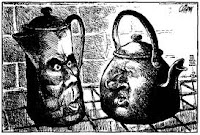Regardless of how developed a society is, there are always norms that exist. Some of those social norms are set by the people of society, some are set by the individual’s community and some are set by the individual’s family. In all of these, there are expectations held by other individuals and any straying from what others discern as being normal is often seen as being unacceptable by those people within the individual’s society, community and family.
 So, what does it actually mean to be judgmental? I, along with many others, have struggled to define its meaning, which may be a testament to how I judge others if I feel they are casting judgment. According to the dictionary, the definition of being judgmental is to form an opinion based on one’s moral beliefs. More explicitly, based on the moral beliefs of the person casting judgment, an opinion of an individual is formed by using a limited number of qualities. Additionally, the person that is casting judgment concludes that those limited qualities makeup his or her whole nature. That is, the one who casts judgment, judges a person’s wholeness by using only a limited amount of information.
So, what does it actually mean to be judgmental? I, along with many others, have struggled to define its meaning, which may be a testament to how I judge others if I feel they are casting judgment. According to the dictionary, the definition of being judgmental is to form an opinion based on one’s moral beliefs. More explicitly, based on the moral beliefs of the person casting judgment, an opinion of an individual is formed by using a limited number of qualities. Additionally, the person that is casting judgment concludes that those limited qualities makeup his or her whole nature. That is, the one who casts judgment, judges a person’s wholeness by using only a limited amount of information.To put it in perspective, the one that casts judgment would say: “the man that committed that crime is a wicked person,” whereas someone not being judgmental would say: “the man that committed that crime did a wicked thing.” In the first case, there is an assumption that the entire being of the man was wicked because he committed a crime and in the second example the act was deemed as wicked.
To best clarify this, let me put it into the context of the Christian and sin. The Bible clearly states that Christians should not be judgmental. But, is the definition of judging others the same as what I’ve just described? Matthew 7:1-2 says: "Judge not, that you be not judged. For with what judgment you judge, you will be judged; and with the measure you use, it will be measured back to you." The word here for “judge” is krinō (cree-noh-to judge) which paired with the word in the second verse krima (cree-mah-to condemn) means that the individual Jesus is referring to is one who condemns the faults of others. To condemn someone is to publicly criticize someone, the personhood of a person, to cast judgment upon that person because of that person’s actions. The simple fact is that we can only make judgments upon the actions of a person. We are not entitled to judge the heart or spirit of the individual because of just a few acts. That would be assuming that we know what God knows, that we have the knowledge of God, that we are the supervisors for God.
Although it may sound counterintuitive, there are times when we are called to discern others’ actions because of their direct effect on us. The Bible tells us to avoid angry people, avoid being unequally yoked, avoid those whose sins may rub off on us or those for which we are held responsible (Proverbs 22:24; 1 Corinthians 5:11-12). A person who is spiritually mature is something that is clearly defined in the Bible: "those who by reason of use have their senses exercised to discern both good and evil" (Hebrews 5:14), "out of the abundance of the heart the mouth speaks" (Matthew 12:34), and "a tree is known by its fruits" (Matthew 12:33).
Simply stated, we have no authority to judge where someone stands with God. Nor do we have the authority to assume anyone is a bad person. But, what we have been called to do is to be able to properly discern both good and evil in our own actions as well as in the actions of others in order to be able to protect ourselves and others from falling into temptation.

